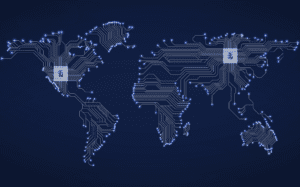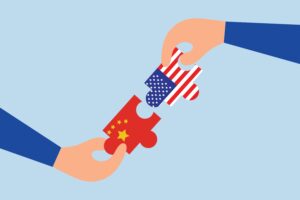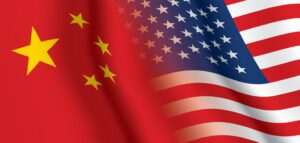Event Video: Shipbuilding – The Next US-China Trade Battle
|
The Office of the United States Trade Representative has initiated “an investigation of acts, policies, and practices of the People’s Republic of China (PRC) targeting the maritime, logistics, and shipbuilding sectors for dominance.” This is one of seven strategic sectors first identified by Beijing as a priority in 2006, and again in their Made in China 2025 plan. On April 24, WITA and the Asia Society Policy Institute hosted an event to look at the trade case against Chinese shipbuilding and logistics industries, past efforts to incentivize American shipbuilding, and what role trade remedies can play to help revitalize this U.S industry. Featured Speakers: Elizabeth Drake, International Trade Attorney and Partner, Schagrin Associates Colin Grabow, Research Fellow, Herbert A. Stiefel Center for Trade Policy Studies, Cato Institute Captain Jonathan Kaskin, U.S. Navy (Ret.); Chair, Merchant Marine Affairs Committee, Navy League of the U.S.; Senior Fellow, Center for Naval Analyses (CNA); Marine Board Member, National Academy of Sciences Rear Admiral Michael McDevitt, U.S. Navy (Ret.); Senior Fellow in Strategic Studies, Center for Naval Analyses (CNA); former Director & Acting Deputy Assistant Secretary of Defense for East Asia, Office of Secretary of Defense, U.S. Department of Defense David Ross, Partner & Chair, International Trade, Investment and Market Access Practice Group, WilmerHale; former International Trade Counsel, United States Senate Committee on Finance Moderator: Wendy Cutler, Vice President and Managing Director, Asia Society Policy Institute (ASPI) Washington, DC Office; former Acting Deputy United States Trade Representative |
|
|
|
It has been a century since the U.S. economy surpassed the combined size of France, Germany, and the UK, largely because America was powered by European immigration and mass production factories. Today, China’s economy exceeds the United States in PPP terms and is expected to exceed it in dollar-denominated terms by 2030. China already leads in advanced industry production with its 2020 output in 10 industries 17 percent higher than America’s and 25 percent higher than the EU’s.
The horse is already out of the barn when it comes to China overtaking Europe and America economically and technologically. The key difference is that when America overtook Europe the two were not adversaries. Today China is, with Xi Jinping referring to the need for China to “win the battle” for core technologies. In contrast, too many U.S. and EU officials still cling to the fiction that it’s possible to negotiate with China to achieve fair competition and even cooperation.
While neither the U.S. nor the EU can hope to change China nor outpace its advanced industry growth, they can and should not lose the battle for either advanced industries (e.g., aerospace, high-speed rail, biopharmaceuticals, semiconductors, machinery, software, etc.), and or emerging ones (e.g., AI, quantum computing, synthetic biology). Collectively these are a principal source of geo-economic power and Chinese victory in these sectors would turn the transatlantic partners (the U.S., UK, and European nations) into techno-economic vassal states, dependent on China for key inputs. China has already won steel, shipbuilding, solar panels, and it is gaining high-speed rail, telecom equipment, EV’s, and machine tools.
Not losing this battle is not about figuring out what policies and programs to adopt. There are many reports from think tanks and others laying out such an agenda. Policymakers could easily craft an actionable agenda by inviting experts to a two or three-day brainstorming retreat. The real problem is that policy makers on both sides of the Atlantic do not take the China challenge seriously enough to do so.
As such, the most important task for the transatlantic policy community is to recognize the true nature of the threat and adopt a new conceptual framework. Albert Einstein once stated that “We shall require a substantially new manner of thinking if mankind is to survive.” Today, if the transatlantic community is to survive, elites will need a new manner of thinking.
|
A Progressive, Principled, and Pragmatic Approach Toward China Policy
|
The following is an excerpt from a recent report published by the Center for American Progress. The U.S. relationship with China will be one of this generation’s defining foreign policy challenges. A key part of the challenge will be discussing the issues without falling back on simplistic, outdated, or inaccurate generalizations. There are few historical parallels of great power rivals as deeply integrated as the United States and China. They have the world’s two largest economies; they are the world’s largest military spenders; and they both are increasingly in competition with each other. As the world’s two largest exporters, their two-way trade exceeded $750 billion in 2022, even as commercial ties frayed and (not coincidentally) the multilateral trading system came under deep stress. Indeed, on issue after issue—from AI to social media and from Taiwan to Ukraine—sharp differences in values and interests create friction between Washington and Beijing. These frictions will play out in how we trade; how our technological ecosystems interact; and how we manage military competition. At the same time, U.S.-China relations cannot and should not be based solely on competition. On a range of critical issues—from climate change to illegal narcotics—cooperation will have tangible benefits for Americans and, often, for people in China and the rest of the world… …Meeting the central foreign policy challenge of the 21st century will require the United States to be smart and strong, to invest in itself, and to be ready to talk as well as to compete with China. CAP [Center for American Progress] lays out a framework for policymakers and the public to rally around. |
|
Does America Have an End Game on China?
|
The following is an excerpt from the ChinaFile article: “Does America Have an End Game on China?” which was co-published with Foreign Policy, and authored by Zack Cooper. This fall, U.S. National Security Advisor Jake Sullivan noted that the Biden administration is “often asked about the end state of U.S. competition with China.” He argued that “we do not expect a transformative end state like the one that resulted from the collapse of the Soviet Union.” Instead, the Biden administration has identified three lines of effort in U.S. relations with China: investing, aligning, and competing. Investing comprises domestic initiatives in the United States while aligning involves cooperation with allies and partners. Thus, the only portion of the Biden administration’s China strategy that explicitly centers on China is competition. Yet, competition does not amount to an objective in itself, but rather a description of current circumstances. As White House Coordinator for the Indo-Pacific Kurt Campbell has warned, “competition is not itself a strategy.” Indeed, before taking office, Campbell and Sullivan argued that an approach centered on strategic competition “reflects uncertainty about what that competition is over and what it means to win.” So the question remains: What is America’s vision of success?… …There are three strong arguments against identifying an end state for U.S. strategy on China. First, “solving” the “China challenge” is a misnomer since even a change of governance in Beijing would bring about new challenges. If the Chinese people choose to make fundamental changes to their country’s political structures tomorrow, tensions over Taiwan and U.S. regional presence would no doubt remain. Political science research even suggests that a democratizing China could worsen tensions with the United States. As a result, some experts have endorsed the Biden administration’s focus on steady states, with Center for a New American Security CEO Richard Fontaine affirming that Washington “should manage global problems, not try to solve them.” Second, bureaucratic disagreements could stymie efforts to select an ideal end state. Although there is growing concern about China in Washington, there remains little consensus on the strategy that U.S. policymakers should adopt. A debate about end states might therefore prove divisive since no single end state is likely to appeal to all stakeholders. Even within the Biden administration, it could be difficult to get democracy and human rights advocates on the same page with environmentalists and economists. Getting Congress on board would be another matter altogether. As a result, it might not be possible bureaucratically to agree on an end state. Third, even if U.S. leaders could agree on what they ultimately want, doing so might alienate allies and partners. For example, if the United States sought to accelerate the collapse of the Communist Party, few if any U.S. allies and partners would be comfortable with that objective. Conversely, returning to a “new type of great power relations” would leave many worried about a great power condominium. Forcing a discussion on end states might thus weaken rather than strengthen the very coalitions that the United States needs to address the challenges that China poses. |
|
|
|
|





